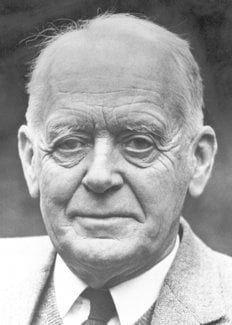John R. Hicks
Biographical

I was born in 1904 at Warwick, England, where my father was a journalist on a local newspaper. I was educated at Clifton College (1917-22) and at Balliol College, Oxford (1922-26), an expensive education financed by mathematical scholarships. Thus, during my school days, and in my first year at Oxford, I was a mathematical specialist; to the mathematical training I received at Clifton, in particular, I owe a great debt. But I was not contented with mathematics; I had interests in literature and in history which I needed to satisfy. My move (in 1923) to “Philosophy, Politics and Economics”, the “new school” just being started at Oxford, was, however, not a success. I finished with a second-class degree, and no adequate qualification in any of the subjects I had studied.
Economists, in those days, were very scarce, so I did pick up a temporary lecturership at the London School of Economics and managed to get continued. I started as a labour economist, doing descriptive work on industrial relations, but, gradually, I moved over to the analytical side. Then I found that my mathematics, by that time almost forgotten, could be revived, and were sufficient to cope with what anyone (then) used in economics. By 1930, when the economics department at the London School got a new lease of life under Lionel Robbins, I had found my feet. “How wonderful it must have been in those days, when such things could be picked up with so little trouble”, my students have said to me since. They were picked up in discussion, with Robbins and Friedrich von Hayek, with Roy Allen and Nicholas Kaldor, with Abba Lerner and with Richard Sayers – and with Ursula Webb, who, in 1935, became my wife.
By 1935, I had got so much that I needed to go away to put it together. Thus, when an opportunity arose for moving, to a university lecturership at Cambridge (and Fellowship of Gonville and Caius College), I took it. My years at Cambridge (1935-38) were mainly occupied in writing Value and Capital which was based on the work I had done in London, so I was not in a state to learn very much from association with Cambridge economists. From 1938 to 1946 I was Professor at the University of Manchester. It was there that I did my main work on welfare economics, with its application to social accounting. In 1946 I returned to Oxford, first as a research fellow of Nuffield College (1946-52), then as Drummond Professor of Political Economy (1952-65), and finally as a research fellow of All Souls College (1965-71).
During these latter years, I have made contributions to several branches of theoretical economics. I have written on money and on international trade, as well as on growth and fluctuations. I have also done some small pieces of applied economics, especially in relation to problems of “developing” countries, several of which I have visited in company with my wife, much of whose work has been in that field. Thus, in 1950, I was a member of a Revenue Allocation Commission in Nigeria, and in 1954, we both of us made an enquiry into the finances of Jamaica. I have been reluctant to pronounce on larger issues of practical economics since I am convinced that one should not pronounce unless one knows the facts; and to keep abreast of changing facts on a world, or even on a nation scale, is more than can be done by one whose main concern is with principles. A mere familiarity with statistics that have been prepared and digested by others is not sufficient.
We now live in the country (Porch House, Blockley, Gloucestershire) but spend a part of each week in Oxford, where we continue to do a little teaching.
I became a Fellow of the British Academy in 1942; a foreign member of the Royal Swedish Academy in 1948, of the Accademia dei Lincei, Italy, in 1952, and of the American Academy in 1958. I am an honorary fellow of Nuffield College, Oxford, since 1958 and of Gonville and Caius College, Cambridge, since 1971. I was President of the Royal Economic Society, 1960-62, and was knighted in 1964. I am an honorary doctor of several British Universities (Glasgow, Manchester, Leicester, East Anglia and Warwick) as well as of the Technical University of Lisbon. I was made (in 1971) an honorary Senator of the University of Vienna.
This autobiography/biography was written at the time of the award and first published in the book series Les Prix Nobel. It was later edited and republished in Nobel Lectures. To cite this document, always state the source as shown above.
John R. Hicks died on May 20, 1989.
Nobel Prizes and laureates
Six prizes were awarded for achievements that have conferred the greatest benefit to humankind. The 12 laureates' work and discoveries range from proteins' structures and machine learning to fighting for a world free of nuclear weapons.
See them all presented here.
